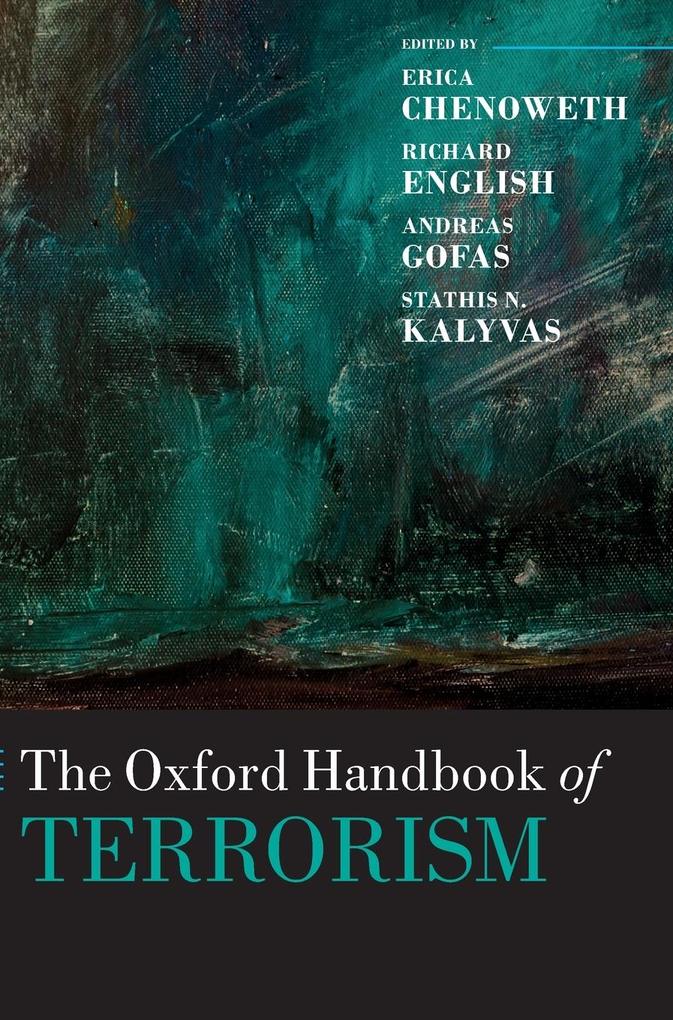
Zustellung: Do, 19.06. - Mi, 25.06.
Versand in 2 Wochen
VersandkostenfreiThis Handbook reviews the state of the art approaches and issues in researching and teaching about terrorism and counterterrorism.
Inhaltsverzeichnis
- Introduction
- 1: Erica Chenoweth and Andreas Gofas: The Study of Terrorism: Achievements and Challenges Ahead
- Part One: Concepts and Typologies
- 2: Stathis Kalyvas: The Landscape of Political Violence
- 3: Ben Saul: Defining Terrorism: A Conceptual Minefield
- 4: Gary LaFree: The Evolution of Terrorism Event Databases
- 5: Virginia Held: The Moral Dimensions of Terrorism
- Part Two: The History of Terrorist Violence
- 6: Warren C. Brown: The Pre-History of Terrorism
- 7: Martin A. Miller: European Political Violence During the Long 19th Century
- 8: John Bew, Alexander Meleagrou-Hitchens, and Martyn Frampton: The Long 20th Century
- Part Three: Approaches and Methods
- 9: Lorenzo Bosi, Donatella della Porta, and Stefan Malthaner: Organizational and Institutional Approaches: Social Movement Studies Perspectives on Political Violence
- 10: Jacob N. Shapiro: Formal Approaches to the Study of Terrorism
- 11: Daren G. Fisher and Laura Dugan: Sociological and Criminological Explanations of Terrorism
- 12: Siniša Maleševi : Anthropological and Cultural Approaches to the Study of Terrorism
- 13: Brenda J. Lutz: Historical Approaches to Terrorism
- 14: John G. Horgan: Psychological Approaches to the Study of Terrorism
- 15: Charlotte Heath-Kelly: Critical Approaches to the Study of Terrorism
- 16: Megan Farrell, Michael Findley, and Joseph Young: Geographical Approaches to the Study of Terrorism
- Part Four: Causes and Motivations
- 17: Jeff Goodwin: The Causes of Terrorism
- 18: Richard English: Nationalism and Terrorism
- 19: Jeffry Haynes: Religion and Terrorism
- 20: Alia Brahimi: Ideology and Terrorism
- 21: Gary Ackerman and Anastasia Kouloganes: Single-Issue Terrorism
- Part Five: Terrorism, Political Violence, and Collective Action
- 22: Tim Wilson: State Terrorism
- 23: Jessica A. Stanton: Terrorism, Civil War, and Insurgency
- 24: Vanda Felbab-Brown: The Crime-Terror Nexus and its Fallacies
- Part Six: Actors, Strategies, and Modus Operandi
- 25: Brian Phillips: Terrorist Organizational Dynamics
- 26: Evan Perkoski: Terrorist Technological Innovation
- 27: Caron E. Gentry: Women and Terrorism
- 28: Rashmi Singh: Suicide Terrorism
- 29: Max Abrahms: The Strategic Model of Terrorism Revisited
- Part Seven: Issues and Pedagogical Challenges
- 30: Erin Miller and Susan Fahey: The Rise and Fall of Terrorism
- 31: Harold Trinkunas: Financing Terrorism
- 32: David B. Carter and Saurabh Pant: Terrorism and State Sponsorship in World Politics
- 33: Gregory D. Miller: Teaching about Terrorism: Methodology and Ethics
- 34: David A. Siegel: New Techniques in Teaching Terrorism
- Part Eight: The Geographical Context of Terrorism
- 35: Luis de la Calle and Ignacio Sanchez-Cuena: Terrorism in Western Europe: A Homegrown Trademark
- 36: Jennifer S. Holmes: Terrorism in Latin America
- 37: Boaz Ganor and Eitan Azani: Terrorism in the Middle East
- 38: Brahma Chellaney: Terrorism in Asia
- 39: Juliet U. Elu and Gregory N. Price: Terrorism in Sub-Saharan Africa: A Recapitulation of Causes and Consequences
- Part Nine: Academic and Policy Perspectives on Countering Terrorism
- 40: Daniel Byman: Counterterrorism Strategies
- 41: Juliette Bird: Terrorism and Counterterrorism: A Policy Perspective
- 42: Andrea Bianchi: Counterterrorism and International Law
- 43: Courtenay R. Conrad: Torture and the War on Terrorism
- 44: Jonathan Evans: Academic Research and the Intelligence Community: Some Reflections
- Part Ten: Autobiographic Reflections on the Evolution of a Field
- 45: Martha Crenshaw: Constructing the Field of Terrorism
- 46: Alex P. Schmid: Institutionalizing the Field of Terrorism
- 47: Richard Jackson: Revising the Field of Terrorism
Mehr aus dieser Reihe
Produktdetails
Erscheinungsdatum
14. Mai 2019
Sprache
englisch
Seitenanzahl
824
Reihe
Oxford Handbooks
Herausgegeben von
Erica Chenoweth, Richard English, Andreas Gofas, Stathis N Kalyvas
Verlag/Hersteller
Produktart
gebunden
Gewicht
1462 g
Größe (L/B/H)
254/177/58 mm
ISBN
9780198732914
Entdecken Sie mehr
Pressestimmen
This vast scope of discussion, with deeply penetrating views by scholars who have immersed themselves in terrorism studies or intelligence for their entire careers, make this handbook a great reference for new or seasoned researchers. J. Agee, independent scholar, CHOICE
Bewertungen
0 Bewertungen
Es wurden noch keine Bewertungen abgegeben. Schreiben Sie die erste Bewertung zu "The Oxford Handbook of Terrorism" und helfen Sie damit anderen bei der Kaufentscheidung.
































